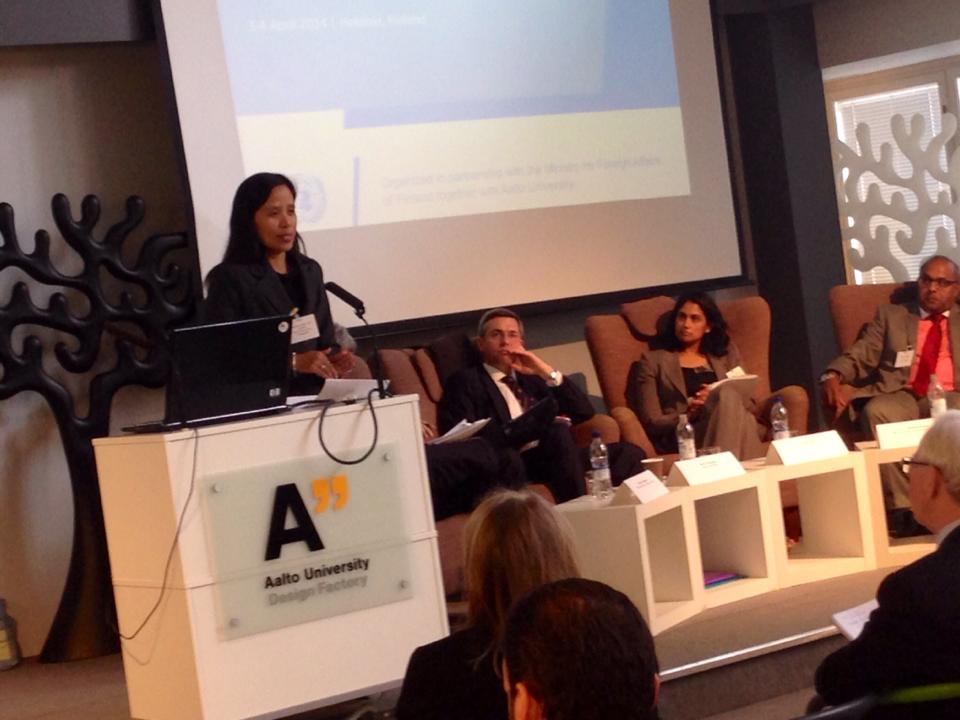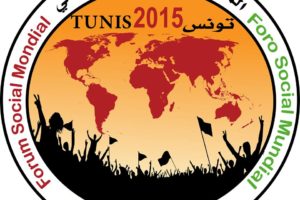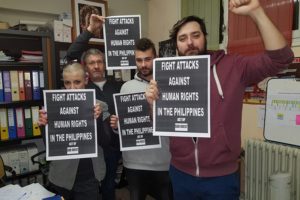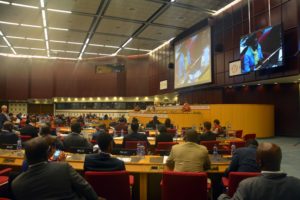Co-Creating New Partnerships for Financing Sustainable Development
3-4 April 2014, Finland
Statement for the session on innovative initiatives and best practices
Jennifer del Rosario-Malonzo
IBON International
Thank you to the Intergovernmental Committee of Experts on Sustainable Development Financing and our host the government of Finland for this opportunity to share our views.
I would like to begin with a few examples of best practices in sustainable development before addressing innovative financing. There are many examples of best practices, but I would like to focus on what works and makes a difference at the local level, on the ground. These practices promote grassroots participation, enhances self-reliance, with production driven by local needs and based on local resources.
[[{“type”:”media”,”view_mode”:”media_large”,”fid”:”483″,”attributes”:{“alt”:””,”class”:”media-image”,”height”:”360″,”style”:”text-align: center; width: 350px; height: 263px; margin: 5px; float: right;”,”typeof”:”foaf:Image”,”width”:”480″}}]]
One example is fair trade, which in the Philippines, is more than buying and selling at fair prices, but is also about helping poor communities fulfill their human rights, is about social justice, dignity and economic opportunity that is not exploitative. Fair trade provides decent jobs with fair wages, socially shared benefits and promotes values that respect human and economic rights. A concrete case is the Panay Fair Trade Center (PFTC), a fair trade business founded in 1991 by a women’s association. It is involved in producing organically grown sugar cane and bananas and is the Philippines’ biggest exporter of fairly traded, certified organic muscovado sugar and banana chips. PFTC provides livelihood and employment to many families in the communities where it operates, helping poor farmers, small sugar millers and unemployed people organize small industries that export to shops selling fairly traded products. It is unfortunate that just two weeks ago the Chairperson of its Board of Directors and former manager, Romeo Capalla, 65, was gunned down, which highlights that to this day grassroots activists, human rights defenders and solidarity entrepreneurs like Capalla fall victim to extrajudicial killings in the Philippines.
Another best practice that needs to be put into more practice is pro-poor procurement, on which Eurodad has done an excellent study[i]. It points that pro-poor procurement has a double dividend for eliminating poverty: while the poor benefit from the outputs of development projects – anew road, bridge or school that the community can use – theyalso gain from the employment and income opportunities that these projects generate. Governments and aid agencies can use their substantial purchasing power to motivate contractors or firms they use to adopt positive social and environmental outcomes. Requiring contractors to comply with labor and environmental standards as well as using procurement to the benefit of the poor and marginalized, especially women, are important steps to sustainability. Unfortunately, despite its evident benefits, pro-poor procurement israrely applied in practice. The reason is often simply about convenience: project managers for instance simply find it quicker and easier to deal with large and experienced contractors, thus limiting the use of pro-poor and sustainable procurement methods.
I have mentioned women, but I would like to particularly highlight the wealth of sustainable practices of rural women in Asia, who face increasing challenges of low income, rising food prices, land grabbing, loss of control over seeds, and climate change among many others. There was an interesting initiative on a ‘travelling journal’[ii]that provides a glimpse into the experiences of women farmers who grow much of the region’s food. These women promote ecological agricultural practices, engage in cooperatives in the effort to raise productivity, and protect community resources including seeds. They had a simple message:help transform agriculture into a more equitable, fair and sustainable system.
So it is my hope that as the discussion on new sources of finance continues, attention is given to how these will support concrete development results and will promote existing best practices that produce real results for the impoverished and at the margins of society.I also hope that the current disproportionate attention to big players such as transnational corporations being at the table to discuss sustainable development shifts from giving undue influence on policy-making to holding them to account to the social, economic and environmental problems they have caused or exacerbated.If there is one important responsibility or role of large corporations in sustainable development, itis to change harmful practices and respect people’s rights wherever they operate.
Civil society has observed that the tendency at present is to focus on mechanisms to generate ‘innovative finance’ that rely on private sector finance, noting that this departs from the original discussion of innovative financing for development that aims to find new ways to increase public sources of finance.[iii]
International financial institutions, donors and the corporate sector are approaching the issue of financing sustainable development with the premise that resources can best be mobilized by providing an enabling environment for private sector innovation and investment. The current emphasis is thus on using ODA to leverage private investments or Public-Private Partnerships (PPPs) especially in infrastructure.
CSOs have already voiced serious concerns about this approach, particularly as it socializes the risks involved in such investments with no clear additional benefits to the public compared to other modes of investment, especially for poor and marginalized communities.
We reiterate that there are many options available for raising and strengthening public financing for sustainable development. Many of us in civil society believe that progressive redistributive measures should be a priority rather than the default reliance on private sector investments or leveraging private finance.
One is financial transactions taxes. FTTs have been estimated to have the potential to raise $250 billion to as much as $650 billion a year for governments to fight poverty, reverse austerity measures and address climate change. Studies show that FTTs have positive economic impacts and could also help regulate markets as a disincentive for destabilizing trading practices.
Taxing pollution and carbon emissions also provides huge potential for additional government revenues. The tax would also be an incentive to use natural resources more efficiently, help encourage the transition towards low-carbon energy technology, and raise significant funding for international climate finance.
Any new sources of development finance or innovative finance mechanisms must prioritize the needs of poor communities especially in developing countries and should be able to induce structural and systemic change to contribute to sustainable development.
Thank you.
_______________________________________________________________________________________________________
[i]See “How to spend it: Smart procurement for more effective aid,” Eurodad, September 2011
[ii]An initiative of the Pesticide Action Network Asia and the Pacific (PAN AP), Asian Rural Women’s Coalition (ARWC), and Oxfam’s GROW Campaign, together with rural organizations in eight countries
[iii]See “Financing Sustainable Development: Are we up to the challenge?” CIDSE, March 2014




